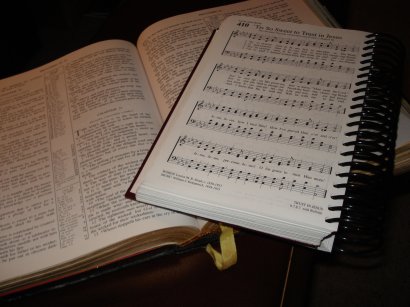
Home
Statement of Faith
Origin of Music
Purpose of Music
Uses of Music in the Church
Uses of Music Personally
The Church Music Ministry
About me
Notes Have Meaning
Discussed in other pages, music (without the words) has the ability to affect the emotions, attitudes, and behaviors of human beings. Since this is the case, the music for a church service should be such as promote desired responses from those in the service. Such proper responses should start with worship and praise of God. Other proper responses from music in a church service would include the fruit of the Spirit listed in Galatians 5:22, 23 – love, joy, peace, long suffering, gentleness, goodness, faith, meekness, and temperance. Church music should be such that create positive responses that are pleasing to God.
So exactly what in the music notes creates these responses? To answer this question, one needs to examine each of the three parts of music: melody, harmony, and rhythm. First, the melody line of a song must have variation to avoid boredom. If you play one note and only one note at a piano repeatedly, the tune gets boring quickly. Boredom is not one of the responses that should be achieved to honor God. However, too much variation can be problem as well. If you sit at a piano and play random notes, white and black keys, the tune will probably not make much sense. This is because music has order and design, not just randomness. In fact, such randomness promotes responses of uneasiness and restlessness, hardly Godly responses. The melody line of a song must be a systematic and appropriate mixture of notes that creates desired Godly responses.
The harmony line can add “color” to the music. It can serve to highlight melody or destroy melody. Music where the harmony supports the melody can create Godly responses in those listening to it. However, when harmony dominates or eliminates melody, chaos and uneasiness result. There are certain guidelines for harmony. When these guidelines are ignored, then the music sounds like random noise and promotes improper responses. Sit down at a piano try the following exercise. Play a simple melody with the right hand, such as middle C, D, and E (or any three white keys next to each other). While you do that, play random notes with the left hand. The result is something that we do not recognize as music. Is there a melody? Yes. But the harmony has destroyed any benefit the melody may have produced. It is very important the harmony line fit the melody line and at the same time not be dominant. Only then can appropriate responses come from the listeners.
Finally, in order for church music to create appropriate responses is that the rhythm be fitting. First, the rhythm should not dominate the music. Many times this domination occurs through the use of drum sets and other percussion instruments playing very loudly. However, other instruments can be used to make the rhythm dominant. A piano playing with a very heavy bass line can make rhythm dominate melody. A bass guitar can dominate melody. When melody is dominated, any benefits derived from the melody are destroyed.
Certain rhythms are also sensual in nature and should never be allowed, regardless of what the words are. One of the objectives of modern secular music has been to promote sexual desire. This is accomplished through rhythm. Does it make sense to have great words to a song but allow the rhythm to suggest immoral behavior? This is just another area in which Satan confuses Christians. The rhythm of a song should be such that it not only supports the melody but does not create improper desires.
Contact Us